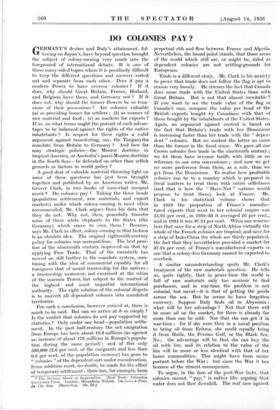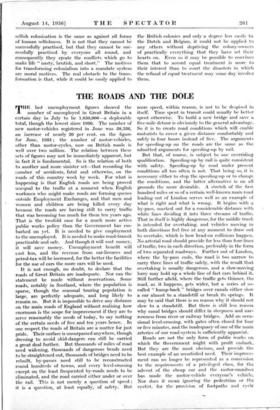DO COLONIES PAY ?
GERMANY'S desires and Italy's attainment, fol- lowing on Japan's, have beyond question brought the subject of colony-owning very much into the foreground of international debate. It is one of those many-sided topics where it is peculiarly difficult to keep the different questions and answers sorted out and separate from each other. Does it pay a modern Power to have oversea colonies ? If it does, why should Great Britain, France, Holland, and Belgium have them, and Germany not ? If it does not, why should the former Powers be so tena- cious of their possessions ? Are colonies valuable (a) as providing homes for settlers ; (b) as sources of raw material and food ; (c) as markets for exports ? If so, on what terms ought the pursuit of such advan- tages to be balanced against the rights of the native inhabitants ? Is respect for these rights a valid argument against transferring, say, the Tanganyika mandate from Britain to Germany ? And how far may strategic policies—the Monroe doctrine in tropical America, or Australia's quasi-Monroe doctrine in the South Seas—be defended on other than selfish grounds as factors in world policy ?
A good deal of valuable material throwing light on some of these questions has just been brought together and published by an American writer, Mr. Grover Clark, in two books of somewhat unequal merit.* Do colonies pay ? Taking the three heads (population settlement, raw materials, and export markets) under which colony-owning is most often recommended, Mr. Clark argues from his data that they do not. Why not, then, peacefully transfer some of these white elephants to the States (like Germany) which crave to own them ? Because, says Mr. Clark in effect, colony-owning in that fashion is an obsolete idea. The original eighteenth-century policy for colonies was mercantilism. The best prac- tice of the nineteenth century improved on that by applying Free Trade. That of the twentieth has moved on still further to the mandate system, com- bining with the idea of commercial equality for all foreigners that of moral trusteeship for the natives : a trusteeship, moreover, not exercised at the whim of the suzerain Power, but subject to the control of the highest and most impartial international authority. The 'right solution of the colonial dispute is to convert all dependent colonies into mandated territories.
For such a conclusion, however arrived at, there is much to be said. But can we arrive at it so simply ?
Is the verdict that colonies do not pay •supported by statistics ? Only under one head—population settle- ment. In the past half-century the net emigration from Europe has been about 19.8 millions (as against an increase of about 173 millions in Europe's popula- tion during the same period) ; and of this only 500,000 (2.6 per cent. of the emigrants and less than 0.3 per cent. of the population increase) has gone to " colonies " of the dependent sort under consideration.
Some addition must, no doubt, be made for the effect of temporary settlement ; there has, for example, been • The Ba.'ance Sheets of Imperialism. (Neii York: Columbia University Press. London: Humphrey Milford. 14e.)--7—:A Place la The Sun. (Macmillan. 10s. 6d.) perpetual ebb and flow between France and Algeria. Nevertheless, the broad point stands, that those areas of the world which still are, or might be, ruled as dependent colonies are not 'settling-grounds for Europeans.
Trade is a different story. Mr. Clark in his anxiety to prove that trade does not follow the flag is apt to reason very loosely. He stresses the fact that Canada does more trade with the United States than with Great Britain. But is not that almost inevitable ?
If you want to see the trade value of the flag in Canada's case, compare the value per head of- the British exports bought by Canadians with • that of those bought by the inhabitants of the United States.
Again, an argument against control is based on the fact that Britain's trade with her 'Dominions is increasing faster than her trade with the " depen- dent " colonies. But we control the latter no more than the former in the fiscal sense. We gave all our Crown colonies free trade in the nineteenth century ; we let them have revenue tariffs with little or no reference to our own convenience ; and now we get no more preference from them, as a rule,- than we get from the Dominions. To realise how profitable colonies can be to a country which is prepared in fiscal matters to treat them with entire selfishness (and that is how the " Have-Not " nations would propose to treat them), look at France. • Mr. Clark in his statistical volume shows that in 1913 the proportion of France's manufac- tured exports that went to her colonial empire 'was 15.95 per cent., in 1929-33 it averaged 26 per cent., and in 1934 it was 37.24 per cent. When one remeni- hers that save for a strip of North Africa virtually the whole of the French colonies are tropical, and save for a strip of Indo-China the whole are thinly populated, the fact that they nevertheless provided a market for 87.24 per cent. of France's manufactured exports is one that a colony-less Germany cannot be expected to overlook. '
A similar misunderstanding spoils Mr. Clark's treatment of the raw materials question. He tells us, quite rightly, that in peace-time the world is full of raw materials only too anxious to find purchasers, and in war-time the problem is not colonial, but naval—it is that of getting the goods across the sea. But he seems to *have forgotten currency. Suppose Italy finds oil in Abyssinia what will be her advantage ? Not that there will be more oil on the market, for there is -already far more than can be sold. Nor that she can get it in war-time ; for if she were then in a naval position to bring oil from Eritrea, she could equally bring it from Haifa, the Persian Gulf, or the Black Sea. No ; the advantage will be that she can buy the oil with lire, and its relation to the value of the lira will be more or less identical with that of her home commodities. This might have been unim- portant before the War ; but since the War it has become of the utmost consequence.
To argue, in the faCe of the post-War facts, that colonies cannot " pay," is rather like arguing' that water does not flow downhill. The real case against selfish colonisation is the same as against all forms of human selfishness. It is not that they cannot be successfully practised, but that they cannot be suc- cessfully practised by everyone all round, and consequently they create the conflicts which go to make life " nasty, brutish, and short." The motives for transforming colonialism into a mandate system are moral motives. The real obstacle to the trans- formation is that, while it could be easily applied to the British colonies and only a degree less easily to the Dutch and Belgian, it could not be applied to any others without depriving the colony-owners of practically everything that they have set their hearts on. Even so it may be possible to convince them that to accord equal treatment is more to their interest than to court the disasters in which the refusal of equal treatment may some day involve them.







































 Previous page
Previous page